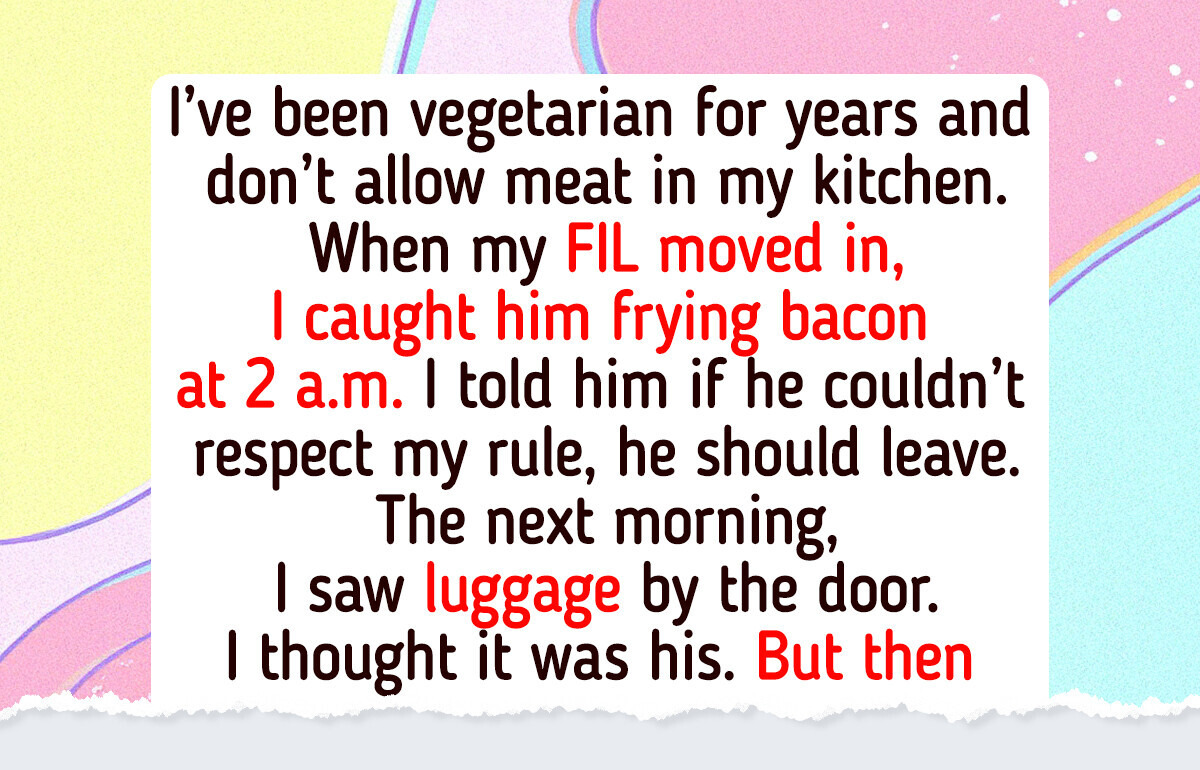I never understood vegans. No one is forcing you to eat meat why are you forcing others to be vegan. Who cares what they eat. Is this worth ruining a marriage over. I have to eat gluten free but my husband can eat whatever he wants.
I Refused to Let My in-Laws Eat Meat, This Is My House

Living with in-laws isn’t always easy, especially when everyday habits collide. One reader shared how a seemingly straightforward household rule—no meat in her kitchen—quickly escalated into unexpected family drama. What began as a simple boundary soon ignited conflict.
This is Emylin’s letter:

Hi Bright Side,
I’ve been a vegetarian for years, and one of my only strict rules is that no meat is allowed in my kitchen. When my father-in-law moved in for health reasons, I laid down that boundary clearly. At first, he nodded along. But soon I started noticing strange smells at night.
One evening, I caught him in the kitchen at 2 a.m., frying bacon. When I told him he couldn’t disrespect my house rules, he smirked and said, “You can’t tell me how to live.” I told him that if he couldn’t accept my rule, he might need to find another place to stay.
The next morning, I woke up and saw luggage by the door. For a moment, I thought my father-in-law had packed up. But then my heart sank — it wasn’t his suitcase. It was my husband’s. He said he couldn’t stand watching me “throw his father out,” and that if I wanted a meat-free home, I’d be living in it without him.
Now I’m sitting here wondering if one house rule has cost me my marriage.
Am I really wrong for standing firm?
Emylin
Thank you for sharing your story — it’s clear that this situation has deeply affected your family. Whether or not you feel you were wrong, the emotional distance and conflict are now very real, and the challenge now is how to move forward thoughtfully and constructively. Here are three pieces of advice that could help you.
Recognize That Shared Spaces Come With Shared Authority

Even if you feel justified in setting household rules, words like “This house is also my father’s house” signal that he may feel sidelined or disrespected in family decisions. The tension might not be about meat at all, but about his sense of being excluded from authority within a shared home.
Next step: Invite him into a calm, face-to-face conversation. Suggest working together to establish household expectations that honor both of your values. Think of it not as giving in, but as building a partnership.
Draw a Clear Line Between Boundaries and Control
Saying “Don’t come here if you don’t follow my rules” to anyone who lives with you may have felt like laying down the law. Being vegan in your own home is a valid choice. Imposing it as an absolute on others navigating loyalty, grief, or identity is likely to backfire.
Action: Introduce zones or compromises — e.g., “No meat in the kitchen, but if you order something, eat it so I don’t see it.” This gives space without changing your values.
Stop Framing This as ‘I Did Nothing Wrong’ — And Start Asking What Needs Repair

I dont eat meat either. I l8ve alone.Had a battle buddy stay with me. I allowed him to use my pans ( never had meat cooked in them) and all to cook what he waned. He was my guest. After he left a couple months layer i deep cleaned my kitchen and bought new pans. I allow my guests to be guests..what i choose has nothing to do with them. So i have to call you out and say you are very wrong and need to apologize to all involved.
Clinging to “I did nothing wrong” might preserve your pride, but it won’t bring your husband or stepdaughter back. Justified or not, the hurt they feel is real.
What to do: Reflect not only on the rule itself, but on how it was communicated. An apology doesn’t mean abandoning your vegan values — it means saying, “I’m sorry I made you feel unwelcome in your own home. That was never my intention.” Sometimes, that small acknowledgment can be the first step toward reopening a closed door.
Despite all the tensions we might face, there is also a lot of kindness in the world.
Here are 15 Stories That Prove Kindness Runs in Some People’s Veins.
Comments
My daughter just moved in due to a separation, we have a difference of opinions on religion and what that all details. I do not force her to obey my beliefs just to live in our home. She came with two kitties, I have two kitties and a dog, I have had a doggie door for 8 years, her kitties have never been outside. We are changing the door out so that her pets don't accidentally go outside. My pets need to learn to go out and wait to be let back in. It's all a compromise to have the ones you love close by. It is worth having someone cook and eat protein in your home if you love your spouse, or find someone whose whole family is vegetarians or vegan. Good Luck with that!
I also was thinking that your husband doesn't like this vegetarian rule either. You guys took the FIL in as he needed help. You can't just turn around and throw him out because he likes bacon. This is you husbands home and your FIL home. Your FIL didn't sign up to be a vegetarian just because he had to move in. I have no clue why you eat the way you do, but your FIL has been eating meat for a lot of years now and is still alive and kicking!
You wanting to put your father in law out of your house is beyond crazy "Karen" you can't force your lifestyle onto someone else that's what is wrong in this country now everyone believes they're entitled and everyone has to conform to their beliefs.
If your married, its all of your house, and if you let fil move in on a permanent basis, then he's a resident, not a guest. Adult residents have a say in the rules. The only thing you have a right to keep food out of is yourself. Not your family, not your kitchen. Stop being a two-bit dicta(s)tor and save your family. Vegans need to realize that Noone would judge them for their choices if they would stop their authoritarian garbage.
He’s cooking meat at 2am because you’ve made him too scared to cook meat in his own home, and you don’t see anything wrong with this? That’s right, it’s his home too now. My five year old son decided he doesn’t want to eat meat, so I cook meals for us up until the point I add the protein, serve his and add vegetarian protein to his, and carry on cooking mine after adding meat. I also cook vegetarian meals for both of us to eat. I was able to compromise, and go some way to saving the planet myself. I won’t force him to go against his morals. I can’t see why this vegetarian insists on cooking all the meals but won’t accomodate the (probably) two omnivores she lives with. Won’t even let them cook their own meat. Why is her way the only way? If her husband and father in law wanted to be vegetarian, or even eat less meat, they would have. Her husband probably just pays it lip service and gorges on McDonald’s and steak dinners outside the house. Like a vegetarian kid my brother knew growing up. He’d go on holidays with my brother and dad to the beach, he didn’t hold back on eating meat there, ate plenty of barbecued sausages, etc, but was forced to be vegetarian by his parents at home for religious reasons. Almost guaranteed your husband is cheating on your vegetarian diet.
Related Reads
My Daughter Refused to Give Us Grandkids, So We Refused to Give Her Inheritance

My Son Wants to Kick Me Out on the Street to Accommodate His New Family

15 Stepchildren Who Finally Saw Their Stepparents as Real Family

15 Moments That Prove Quiet Kindness Is What Keeps the World Together

I Quit After My Boss Denied Me My Lunch Break

15 Moments That Prove Kindness and Compassion Are the Only Currencies That Never Lose Their Value

13 Stories of Quiet Kindness That Show Superhuman Strength in Ordinary People

I Refused to Let My Boss Track My Every Move—I Don’t Need an “Ankle Monitor”

15 Moments That Teach Us to Stay Kind, Even When the World Gets Tough

13 Life Moments That Prove Kindness Costs Little but Goes Far

10+ Stories That Remind Us Why Small Acts of Kindness Echo Forever

16 Moments That Show Kindness Is the Quiet Courage the World Needs

